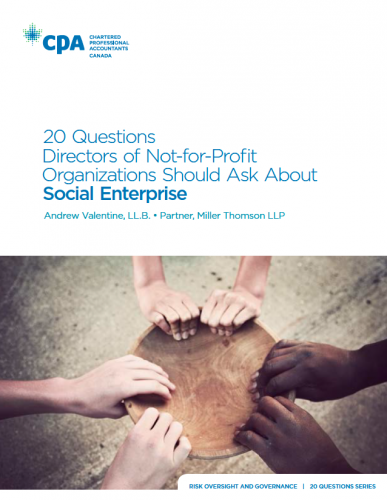20 Questions Directors of Not-for-Profit Organizations Should Ask About Social Enterprise helps you, as a director of an NFP considering or already conducting activities through a social enterprise, address common issues and questions regarding such operations.
YOU WILL LEARN ABOUT:
- key concepts in the burgeoning sector of social enterprise including:
- the wide range of definitions of the term social enterprise
- examples of social enterprises in Canada
Introduction
Social enterprise is a rapidly growing sector in Canada. More and more charities and non-profit organizations (NPO) are looking to social enterprise as a promising new vehicle for pursuing social goods while easing dependence on donations and government grants. The combination of social objectives, business-like activities and private investment presents exciting possibilities for funding and advancing socially beneficial goals.
With these possibilities come significant challenges. The directors of an organization that conducts a social enterprise need to understand the special responsibilities and risks of this activity. The experience of many board members in the not-for-profit and for-profit worlds may only partially prepare them for the unique balancing of priorities and stakeholder interests that arises in the social enterprise context.
This publication aims to provide directors of not-for-profit organizations with an overview of the issues and questions they face in establishing, running and ultimately exiting a social enterprise. This information is equally important for directors of organizations that are considering conducting activities through a social enterprise and directors of organizations that already operate one. Our objective is to give directors a better understanding of these issues and the steps they can take to meet the challenges of overseeing these operations.
Read more
Download 20 Questions Directors of Not-for-Profit Organizations Should Ask About Social Enterprise
Contents
| Preface | ||
| Introduction | ||
| Key Concepts | ||
| • | What is social enterprise? | |
| • | What are some examples of social enterprise? | |
| Structural and Pre-Operational Considerations | ||
| • | What planning issues should be considered when establishing a social enterprise? | |
| • | Operational priorities | |
| • | Funding sources | |
| • | Business plan and budget | |
| • | Structure | |
| • | Possibility of failure | |
| • | Exit strategy | |
| • | How can a social enterprise be structured? | |
| • | For registered charities, what tax compliance risks may arise? | |
| • | For NPOs, what tax compliance risks may arise? | |
| • | What are some of the challenges faced by social enterprise? | |
| • | Multiple objectives and tension in organizational culture | |
| • | Multiple stakeholders | |
| • | Tension between parent not-for-profit and social enterprise subsidiary | |
| • | How should the board think about business risks? | |
| • | How can/should a social enterprise be controlled? | |
| Post-Implementation Guidance 23 | ||
| • | What are the board’s fiduciary duties in the context of a social enterprise? | |
| • | What qualifications or skills should board members have? | |
| • | What are the pros and cons of paid versus volunteer staff? | |
| • | What training should a social enterprise provide to board members and employees? | |
| • | How can the board measure the success of a social enterprise? | |
| • | Social return on investment | |
| • | Social accounting and audit | |
| • | How can the board ensure that the social enterprise maintains its mission focus? | |
| • | What are the social enterprise’s regulatory reporting requirements? | |
| • | How should the board communicate with stakeholders? | |
| • | Winding Up a Social Enterprise | |
| • | When should a social enterprise wind-up? | |
| • | How should the assets of a social enterprise be dealt with on wind-up? | |
| • | What steps must be taken to wind-up the social enterprise? | |
| Conclusion | ||





